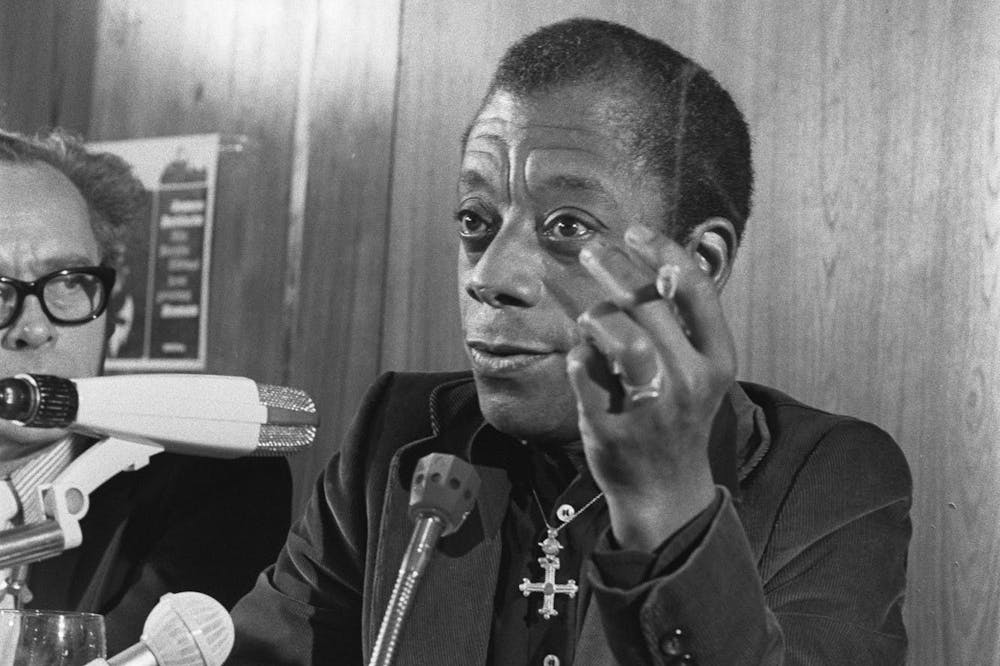Editor’s Note: This piece includes language and imagery that some readers may find distressing.
“It took a long time for me to disengage myself from this excitement, and on the blindest, most visceral level, I never really have, and never will.”
This statement, which James Baldwin makes in The Fire Next Time, orients the reader to his everlasting connection to religion, despite the fact that he had left his Pentecostal church 20 years prior to writing it. Though he skips past this point, offering no more thoughts beyond it, I have to admit that I share a similar sentiment.
If anyone asks, I tell them how undecided I am, even if I am taking two heavily religious classes within the African American Studies department. Growing up in Jamaica, I was convinced I wanted to be a surgeon. Following Jamaica’s rejection, New York was kind enough to nurture me for the past two years.
Since then, I’ve been in the pursuit of something that allows me to define for myself what I value, to decide on what grounds Kristal is to be able to contribute anything worthwhile to this absolute sh*t show of a world.
Acknowledging how much I genuinely enjoyed my religion-based classes was one of the scariest facts I had to face at Princeton. Despite being raised as Catholic, I currently identify as an atheist. Admittedly, this is primarily because I never want to be stuck in the agonizing pain of an existential crisis, wondering how “pure” I am, given that my identity as a lesbian is both something I cannot and don’t want to control. Hence, it’s easier not to believe.
And yet, even as we’re critiquing Christianity’s obsession with establishing itself as the gatekeeper of identity within my seminar, AAS 358: Sexuality and Religion in America, the readings always find a way to draw me back to Jamaica.
In the same way the idea that “sinners shall be bound in hell a thousand years” confronts Baldwin at the Nation of Islam with Elijah Muhammad, and Sethe is constantly drawn back to the plantation in Toni Morrison’s Beloved, Jamaica always seems to call me home — despite the fact that I haven’t actually been home since I had to flee two years ago. I have since been existing within a general state of “self-imposed exile,” as poet Staceyann Chin puts it.

Despite the fact that Jamaica has never been willing to make way for my queerness in light of its Christian theology, despite the fact that Jamaica stood as witness while my mother threatened to kill me and brought me to conversion therapy to rid me of my queerness — it still calls to me.
Jamaica has been the home of my mother, my mother’s mother, and my paternal grandmother. All of them have unknowingly suffered the consequences of a white patriarchy, and Jamaica stood there as witness. Jamaica is the home of the oldest school in the Anglo-Caribbean world, which, after discovering my queerness, established a new rule to ensure I could never return. And for these many reasons, I cannot reconcile Jamaica as being my home. At least not right now.
All of this was in the name of the Lord, for “sinners shall be bound in hell a thousand years.” And you see, my reluctance over entertaining any possible interest in religion isn’t due to the fact that it triggers me, because it doesn’t. Rather, as Baldwin so eloquently put it, it’s as a result of me considering, “What will happen to all this beauty?”
As I’ve reflected on the innocence of so many queer persons, such as Sarah Hegazi, who fled to Canada from Egypt’s brutality, only to take her own life some years later, I can’t help but wonder if I’ll ever be able to move past this. I wonder who I would have been if I never had to see my own mother hold a knife to me, if I never had to endure my father’s narcissism and self-inflicted feelings of inferiority.

Christianity has ruled the entirety of my life. Even as I enter Princeton as a first-year, hoping to make it mine, separate from anyone else’s ideas about who I should be, it’s difficult not to recognize how present my “past” Catholic identity is. Similar to Baldwin, I simply cannot escape the church.
When I talked to a mentor of mine recently, I finally admitted to another person that there was a chance I would end up majoring in religion. I told him about how confusing it was to be so intrigued by a system that has done nothing but condemn me for 16 years. He tends to be very perceptive and rational, especially when I don’t think I need him to be.
The difference, he says, is that this time around, I get to decide where I stand with it. I get to critique it and figure out how the hell it even came to have such an impactful hold on my life in the first place, in a way that upsets the previous power balance that has always existed between us.
Maybe I’ll take that advice, or maybe I’ll end up pursuing a different field — I have a couple of semesters to decide. I’ll end with one of my favorite lines from The Fire Next Time: “If the concept of God has any validity or any use, it can only be to make us larger, freer, and more loving. If God cannot do this, then it is time we got rid of Him.”








